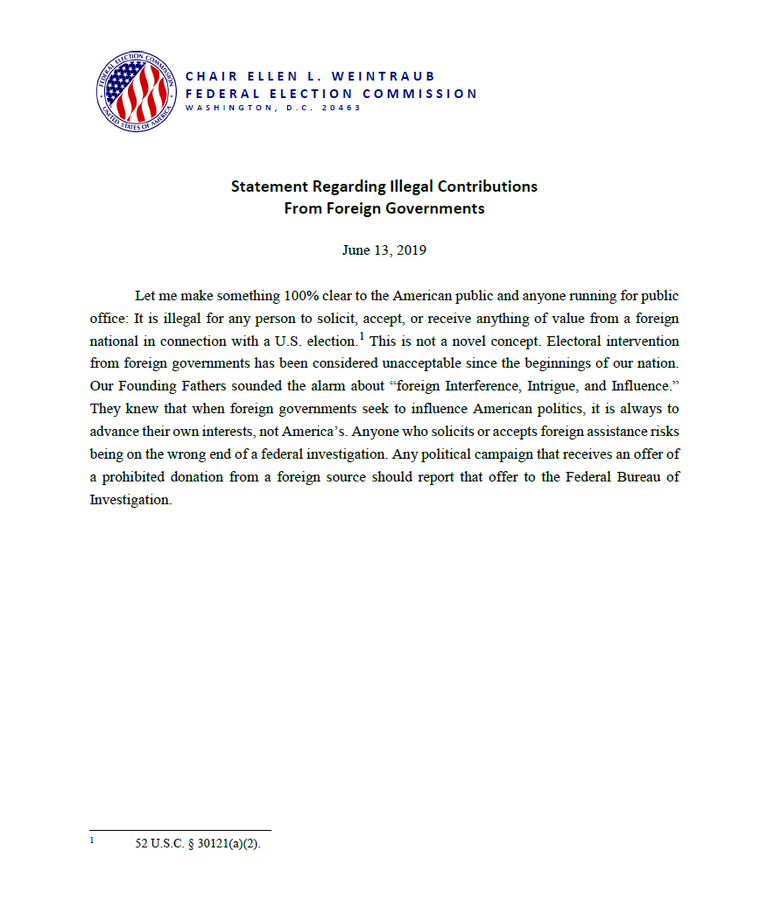Earlier this week, President Trump declared himself “your president of law and order.” In the June 1 speech in the Rose Garden, the president sought to draw a distinction between himself and the rioters around the country, but, after three years of the Trump Administration, it may be too late to pivot to law and order. Thus far, the Trump presidency has been anything but a law and order administration.
Mr. Trump first got himself into legal trouble when he admitted firing FBI Director James Comey over “this Russia thing” on national television. The statement was tantamount to an admission that Trump had been attempting to interfere with a federal investigation.
When the Mueller report on the Russia investigation was completed two years later, it did not find conclusive evidence that the Trump campaign conspired with Russia, although it noted that members of the Trump campaign and Russian government agents did attempt to share information on several occasions. The report did, however, set out 10 separate counts of obstructive behavior by the president. Mueller could not indict the president due to longstanding Justice Department guidelines.
The ink was no sooner dry on the Mueller report than President Trump told ABC’s George Stephanopoulos “I think I’d want to hear it” if a foreign government offered information on an opponent to his campaign. The interview prompted FEC Chair Ellen Weintraub to tweet that it is “illegal for any person to solicit, accept, or receive anything of value from a foreign national in connection with a US election.”
Of course, we now know that Donald Trump was already actively soliciting help from another foreign government by that point. By June 2019 when the interview took place, Trump and his subordinates were already working to get dirt on Joe Biden from Ukraine. In the course of trying to use military aid to pressure the Ukrainian government, the Trump Administration violated the Impoundment Act, which regulates how money appropriated by Congress must be spent.
President Trump also played fast and loose with the law when Congress didn’t accede to his demands. In February 2019, the president declared an emergency in order to divert military funds toward building a border wall. A few months later in May 2019, the president declared another national emergency to enable the sale of $8.1 billion of military items to several countries, including Saudi Arabia and the United Arab Emirates. In both cases, the only emergency was the inability of Donald Trump to negotiate a favorable deal with Congress.
President Trump has also abused his authority to protect some of his loyal footsoldiers. Last month, the president persuaded the Justice Department to drop the charges against former National Security Advisor and longtime Trump friend, Mike Flynn, who had pled guilty to lying to the FBI. Just a few days ago, Trump signaled his intention to protect another longtime ally, Roger Stone. Stone was convicted of seven counts relating to obstructing the Russia investigation including witness tampering and lying to investigators. Trump retweeted a Charlie Kirk tweet calling for a pardon for Stone, who Trump said could “sleep well at night.”
Finally, the president has left a trail of destroyed careers in his attempts to cover his tracks and exact revenge on people who stood up for “law and order.” Most recently, President Trump has fired four inspectors general including the man who vetted the Ukraine whistleblower claim, the woman who revealed the Administration’s poor early response to the pandemic, the man who would chair the board providing oversight for the Administration’s disbursement of pandemic relief funds to businesses, and the man who was investigating both Secretary of State Pompeo’s use of government employees for private errands as well as the national emergency declaration relating to the Saudi arms sale. The common thread in all four cases was that the IGs were doing their jobs in ways that were embarrassing to Donald Trump.
Former Secretary of State Rex Tillerson said that Trump’s ideas often included violating the law.
“So often, the president would say, ‘Here’s what I want to do, and here’s how I want to do it,’ ” Tillerson said, according to the Houston Chronicle, “and I would have to say to him, ‘Mr. President, I understand what you want to do, but you can’t do it that way. It violates the law.’”
A major problem since 2018 is that people like Tillerson, John Kelly, and James Mattis are no longer in the White House. That trio had the intestinal fortitude and independence required to tell a president “no.” Now that these adults are gone, few have enough gumption to tell the president harsh truths and the result has been a long chain of catastrophically bad decisions.
Donald Trump wants to be the law and order president but, for many voters, it is too late for that. For the past four years, we have seen President Trump twisting the law and abusing his office to protect himself and his friends. Sending troops to put down riots won’t erase those abuses of power. In fact, as the president claimed to be “your president of law and order and an ally of all peaceful protesters,” park police were clearing peaceful protesters out of Lafayette Park for the president’s photo-op at St. John’s church in what turned out to be one of the great public relations disasters of the Trump Administration (of which there have been many),
Donald Trump obviously believes that law and order are ideas that apply to others, but not himself or his friends. It is unAmerican for presidents, elected officials, and, yes, police, to have the attitude that the law is for thee but not for me.
Originally published on The Resurgent



No comments:
Post a Comment